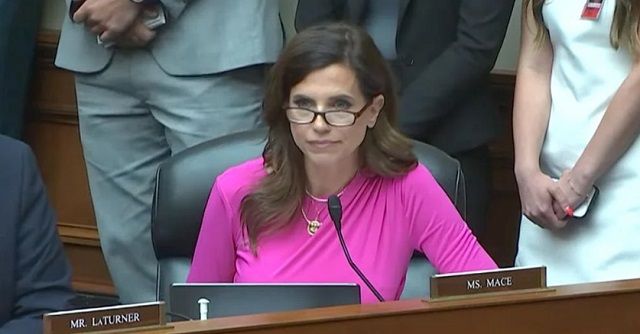International
Cheatle resigned after two articles of impeachment were filed against her

U.S. Rep. Nancy Mace, R-South Carolina
From The Center Square
Two articles of impeachment were filed against U.S. Secret Service Director Kimberly Cheatle just before she resigned Tuesday over security failures at the Pennsylvania campaign event where former President Donald Trump was shot.
A Florida congresswoman asked for criminal charges to be brought against her, and two Republicans, Greg Steube, R-Florida, and Nancy Mace, R-South Carolina, took actions for her to be impeached.
After she resigned, U.S. Rep. Marjorie Taylor Greene, R-Georgia, said Cheatle “will not get to slither away and enjoy retirement.” She still needed to be investigated for her “role in the attempted assassination of former President Donald Trump. There may be criminal charges coming in the future. I think she showed up to the Oversight Committee, refused to answer our questions, did not bring any of the information that we asked her to bring in subpoenaed, she came in and participated in a full cover up and then resigned … that speaks a message loud and clear.”
If Cheatle hadn’t resigned, she might have been the second cabinet member to be impeached by the House after her boss, Department of Homeland Security Secretary Alejandro Mayorkas. Mayorkas was impeached on two counts in February for his role in creating the border crisis. Multiple Congress members and others have called for Mayorkas to resign following the July 13 assassination attempt of former President Donald Trump.
Greene also said Cheatle and Mayorkas “will face accountability for actions, including possible criminal investigations.”
Although Cheatle was an appointed officer, impeachment could still be possible. One presidential cabinet member was impeached after resigning, Secretary of War William Belknap, over corruption charges in 1876. The Senate said he was eligible to be impeached and tried even though he resigned, according to the Congressional Research Service. He was later acquitted.
“The Secret Service calls themselves ‘one of the most elite law enforcement agencies in the world,’” Steube said. “What happened under their watch in Butler, Pennsylvania, was an international embarrassment and an inexcusable tragedy.”
On Monday, he filed one article of impeachment against Cheatle “for her dereliction of duty as it relates to the assassination attempt on President Trump’s life.”
The article states Cheatle “has negligently failed to uphold the agency’s mission and statutory charge to ‘ensure the safety and security’ of ‘protectees, key locations, and events of national significance.’”
It describes a range of security failures and conflicting statements Cheatle made to media outlets. It also addresses her action to shift the focus of the Secret Service from “solely providing the best protection services possible for protectees to meet arbitrarily set diversity hiring quotas.”
Mace also filed a privileged motion, requiring the House to vote on impeaching Cheatle within 48 hours. By the time she resigned, she had 24 hours left.
“This is an unprecedented resolution – never in American history has the House voted to impeach what is called an ‘inferior officer,’ or an appointed member of the administration who is not subject to Senate confirmation,” Mace said in a statement.
Cheatle’s “gross dereliction of duty since July 13th led to an unprecedented security breach and a preventable tragedy,” Mace said after an “absolutely egregious” performance at Monday’s Congressional hearing, where Cheatle testified. “She failed to provide us with answers. She failed to tell us a timeline. She failed in every way imaginable. As a result, her failure not only cost the life of someone, but also undermined the trust and confidence placed in the Secret Service by the American people. After today’s hearing – with the extreme lack of transparency and accountability, this impeachment resolution is a necessary step to hold her accountable for her actions.”
After several hours of committee members expressing frustration over Cheatle not answering questions, Chairman Rep. James Comer, R-Kentucky, told her, “You answered more questions with an ABC News reporter than you have with members of Congress. You’re here with a subpoena and we expect you to answer the questions.”
Mace then hammered Cheatle with a series of yes or no questions. She first gave Cheatle the opportunity to use her five minutes to draft her resignation letter; Cheatle declined.
She asked if the Secret Service had “been transparent with this committee?” to which Cheatle replied, “yes.” Mace then asked if “the fact that we had to issue a subpoena to get you to show up today” was transparent and Cheatle attempted to answer but Mace cut her off saying, “no, we had to issue a subpoena to get you to show up today.”
In response to Cheatle stating earlier that the Secret Service wasn’t political, Mace asked her how her opening statement was leaked to three media outlets several hours before the hearing. Cheatle said, “I have no idea how my statement got out.” Mace replied, “well that’s bull****.”
She also asked Cheatle if the Secret Service was fully cooperating with the committee; Cheatle replied, “yes.” Mace said the committee sent her a list of demands for information on July 15 and still hadn’t received answers. Each time Mace asked a question, Cheatle replied, “I’ll have to get back to you on that,” to which Mace replied, “that is a no.”
“You’re just being completely dishonest,” Mace said. “You are being dishonest or lying. These are important questions that the American people want answers to and you’re just dodging … we had to subpoena you to be here and you won’t even answer the questions. We’ve asked you repeatedly to answer our questions. These are not hard questions.”
espionage
U.S. Charges Three More Chinese Scholars in Wuhan Bio-Smuggling Case, Citing Pattern of Foreign Exploitation in American Research Labs

Federal prosecutors allege visiting researchers at the University of Michigan’s “Xu Lab” conspired to import undeclared biological materials from Wuhan.
Federal prosecutors have charged three additional Chinese research scholars connected to the so-called “Xu Lab” at the University of Michigan with conspiring to smuggle biological materials from Wuhan and making false statements — the latest in a string of national security cases involving suspicious research activity at the university’s Life Sciences Institute.
Named in a newly filed criminal complaint are Xu Bai, 28, and Fengfan Zhang, 27, who face conspiracy counts, and Zhiyong Zhang, 30, who is accused of making false statements. All three held student exchange visas and worked in the lab of Xianzhong “Shawn” Xu, according to the Justice Department. Chengxuan Han, a Chinese citizen who also worked in Xu’s lab, previously pleaded no contest in the related roundworm smuggling case.
According to the complaint, in 2024 and 2025 Bai and Fengfan Zhang received multiple shipments containing concealed biological materials related to roundworms that had been sent from China by Han, a doctoral student at Huazhong University of Science and Technology in Wuhan. The case accelerated when Han traveled to work in the Xu Lab in June 2025. She was questioned at the border and allegedly evaded searches by wiping her phone and concealing biological material.
“At some point, pattern becomes practice. And, apparently, these three men are part of a long and alarming pattern of criminal activities committed by Chinese nationals under the cover of the University of Michigan,” U.S. Attorney Jerome F. Gorgon Jr. said. “This is a threat to our collective security.”
As the Federal Bureau of Investigation counterintelligence case takes shape, the alleged facts resemble a much more serious episode that occurred before the COVID-19 pandemic at Canada’s most secure pathogen research lab in Winnipeg. In that case, according to Canadian intelligence reports, Chinese international students working under Chinese Canadian scientist Xiangguo Qiu were found to be clandestinely importing and exporting biological materials and secretly using the high-security facility for research connected to People’s Liberation Army biological weapons and vaccine programs, including Ebola and bat filovirus studies at the Wuhan Institute of Virology.
Earlier this year, the Justice Department accused two other China-linked researchers, Zunyong Liu and Yunqing Jian, of smuggling Fusarium graminearum — a crop pathogen cited in scientific literature as a potential agricultural terror agent — into the United States for University of Michigan-related research. Their communications referenced shipping biological materials and research plans. Both face smuggling and related charges.
In the new Michigan case, prosecutors allege multiple packages of concealed biological material related to nematode roundworms were shipped from China in 2024 and 2025 by a doctoral student in Wuhan and received by University of Michigan-affiliated scholars. The Justice Department says Han, the prior shipper, pleaded no contest to smuggling and false statement charges this summer before being removed from the United States.
After Han’s removal and an internal university probe into the Xu Lab, the three defendants were terminated for refusing to attend a mandatory meeting, according to the indictment. Investigators say the men then bought tickets to leave from Detroit on Oct. 20, rebooked for Oct. 15, and ultimately attempted to fly out of John F. Kennedy International Airport at 2 a.m. on Oct. 16. During a customs inspection, one defendant allegedly made false statements about Han, while two others admitted receiving packages from her, including after her arrest.
Shawn Xu, who runs the X.Z. Shawn Xu Laboratory, is not charged. From Ann Arbor, Michigan Live reported that federal investigators have not searched Xu, according to his attorney David Nacht.
Xu “has lived in the United States for decades,” Nacht told Michigan Live, adding that Xu studies worms sourced domestically that are not used for commercial purposes.
In the earlier case, Han admitted sending concealed biological materials to University of Michigan recipients. Although the materials were not considered harmful, prosecutors said the shipments violated import and labeling laws.
A Justice Department press release attributed sharp warnings to senior officials about the misuse of academic pathways. “Educational institutions must enhance their admissions procedures to prevent exploitation,” an acting Immigration and Customs Enforcement director said.
“The Chinese nationals charged allegedly were involved in smuggling biological materials into the U.S. on several occasions,” FBI director Kash Patel said. “The FBI and our partners are committed to defending the homeland and stopping any illegal smuggling into our country.”
The Bureau is a reader-supported publication.
To receive new posts and support my work, consider becoming a free or paid subscriber.
Daily Caller
UN Chief Rages Against Dying Of Climate Alarm Light


From the Daily Caller News Foundation
The light of the global climate alarm movement has faded throughout 2025, as even narrative-pushing luminaries like Bill Gates have begun admitting. But that doesn’t mean the bitter clingers to the net-zero by 2050 dogma will go away quietly. No one serves more ably as the poster child of this resistance to reality than U.N. chief Antonio Guterres, who is preparing to host the UN’s annual climate conference, COP30, in Brazil on Nov. 10.
In a speech on Monday, Guterres echoed poet Dylan Thomas’s advice to aging men and women in his famed poem, “Do not go gentle into that good night:”
Do not go gentle into that good night,
Old age should burn and rave at close of day;
Rage, rage against the dying of the light.
Dear Readers:
As a nonprofit, we are dependent on the generosity of our readers.
Please consider making a small donation of any amount here.
Thank you!
Though wise men at their end know dark is right,
Because their words had forked no lightning they
Do not go gentle into that good night.
Seeing that his own words have “forked no lightning,” Guterres raged, raged against the dying of the climate alarm light.
“Governments must arrive at the upcoming COP30 meeting in Brazil with concrete plans to slash their own emissions over the next decade while also delivering climate justice to those on the front lines of a crisis they did little to cause,” Guterres demanded, adding, “Just look at Jamaica.”
Yes, because, as everyone must assuredly know, the Earth has never produced major hurricanes in the past, so it must be the all-powerful climate change bogeyman that produced this major storm at the end of an unusually slow Atlantic hurricane season.
Actually, Guterres’ order to all national governments to arrive in Belem, Brazil outfitted with aspirational plans to meet the net-zero illusion, which everyone knows can and will never be met, helps explain why President Donald Trump will not be sending an official U.S. delegation. Trump has repeatedly made clear – most recently during his September speech before the U.N. General Assembly – that he views the entire climate change agenda as a huge scam. Why waste taxpayer money in pursuit of a fantasy when he’s had so much success pursuing a more productive agenda via direct negotiations with national leaders around the world?
“The Green New Scam would have killed America if President Trump had not been elected to implement his commonsense energy agenda…focused on utilizing the liquid gold under our feet to strengthen our grid stability and drive down costs for American families and businesses,” Taylor Rogers, a White House spokeswoman, said in a statement to the Guardian. “President Trump will not jeopardize our country’s economic and national security to pursue vague climate goals that are killing other countries,” she added.
The Guardian claims that Rogers’s use of the word “scam” refers to the Green New Deal policies pursued by Joe Biden. But that’s only part of it: The President views the entire net-zero project as a global scam designed to support a variety of wealth redistribution schemes and give momentum to the increasingly authoritarian forms of government we currently see cracking down in formerly free democracies like the U.K., Canada, Germany, France, Australia and other western developed nations.
Trump’s focused efforts on reversing vast swaths of Biden’s destructive agenda is undoing 16 years of command-and-control regulatory schemes implemented by the federal government. The resulting elimination of Inflation Reduction Act subsidies is already slowing the growth of the electric vehicles industry and impacting the rise of wind and solar generation as well.
But the impacts are international, too, as developing nations across the world shift direction to be able to do business with the world’s most powerful economy and developed nations in Europe and elsewhere grudgingly strive to remain competitive. Gates provided a clear wake-up call highlighting this global trend with his sudden departure from climate alarmist orthodoxy and its dogmatic narratives with his shift in rhetoric and planned investments laid out in last week’s long blog post.
Guterres, as the titular leader of the climate movement’s center of globalist messaging, sees his perch under assault and responded with a rhetorical effort to reassert his authority. We can expect the secretary general to keep raging as his influence wanes and he is replaced by someone whose own words might fork some lightning.
David Blackmon is an energy writer and consultant based in Texas. He spent 40 years in the oil and gas business, where he specialized in public policy and communications.
-

 Censorship Industrial Complex2 days ago
Censorship Industrial Complex2 days agoHow the UK and Canada Are Leading the West’s Descent into Digital Authoritarianism
-

 Business2 days ago
Business2 days agoCapital Flight Signals No Confidence In Carney’s Agenda
-

 International2 days ago
International2 days agoThe capital of capitalism elects a socialist mayor
-

 Energy1 day ago
Energy1 day agoEby should put up, shut up, or pay up
-

 Business2 days ago
Business2 days agoPulling back the curtain on the Carney government’s first budget
-

 Daily Caller1 day ago
Daily Caller1 day agoUS Eating Canada’s Lunch While Liberals Stall – Trump Admin Announces Record-Shattering Energy Report
-

 Business1 day ago
Business1 day agoThe Liberal budget is a massive FAILURE: Former Liberal Cabinet Member Dan McTeague
-

 Business1 day ago
Business1 day agoCarney’s budget spares tax status of Canadian churches, pro-life groups after backlash








